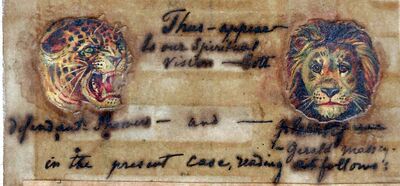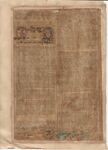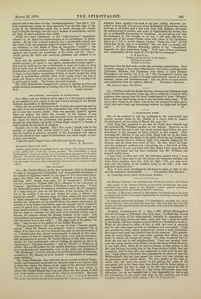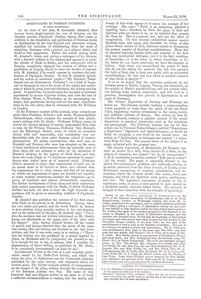< Correspondence (continued from page 7-45) >
long as we are forced to transmit these ideas in a general way—particularly being impracticable without the invention of special words —it will be unprofitable to push discussion to any great lengths. We would only make ourselves obnoxious to the general reader, and receive from other anonymous writers such unconvincing compliments as “Scrutator” has favoured us with.
Now York, March 7tb, 1877.

"Isis unveiled"
Sir,—Mr. Gerald Massey, in the late hysterical effort to rid himself of some of his apparently indigestible and uncomfortable knowledge of the subject of Egyptian culture, in the pages of The Spiritualist newspaper, has fallen into an error which I proceed to point out in the following brief extract from page 415 of Lempriere’s Bibliotheca Classica, revised by William Park, M.A., librarian of the University of Glasgow. Speaking of the statue of Memnon, Lempriere says: “It had the wonderful property of uttering a melodious sound, like the snapping of a harp string, as soon as the first rays of the morning fell on it; but at the setting of the sun, and during the night, it uttered very lugubrious sounds. Cambyses, king of Persia, during the havoc which he made amongst the temples of Egypt, when he invaded the country, wreaked his vengeance on the person whom this statue represented, by causing it to be broken and thrown upon the ground, but its wonderful power of speech STILL remained, and the superstition of the people was more firmly riveted to it than ever, when even in its mutilated state it did not cease to welcome the first smile of its beautiful mother, nor to bemoan her absence during the gloomy watches of the night. This extraordinary phenomenon was witnessed by some of the most exalted and illustrious men in the world.” “The upper part of the statue,” he adds, “may be seen in the gallery of the British Museum.”
Without pretending to lay claim to any of those “literary qualifications” which Mr. Massey very properly “fails to recognise,” but of which, if the idea were not too preposterous, and he were not writing of ME, I should judge that, almost unconsciously to himself, he felt somewhat jealous, it may be remarked, that I have even had the inconceivable presumption to precede Mr. Gerald Massey in that field, where, to imitate his own questionable style of writing, he appears as yet to be wandering in “Egyptian darkness;” and the History of Religions, of which I was not the author, but the humble translator, commended itself for its profundity and impartiality, even to the mind and judgment of “Mr. Bradlaugh,’’ in whose presence Colonel Olcott has had the temerity, according to Mr. Massey, to avow himself “a Spiritualist of seventeen years standing.”
Mr. Austin Holyoake, who staid with me for several weeks at Teignmouth, and frequently mentioned the attention that I was only too glad to show him during his illness, in the pages of the National Reformer for 1872, would have been only too happy were he now living, to inform Mr. Gerald Massey that I am just about the last person to find fault with another on the score of his religious proclivities. Had any anther, in attacking the Hindoos, been as unjust to them as Madame Blavatsky has shown herself to be towards the Christians, I would have defended them equally to the best of my poor ability, whenever permitted to do so, and it is BECAUSE of my detestation of fanaticism among believers of all faiths, that I find such fault with Madame Blavatsky for endeavouring to awaken and nurse in Spiritualists the feeling that she is professedly denouncing in Christians. As you tell me you wish the discussion on Isis brought to an end, I will only add that the greater part of the second volume teems with abuse of the Christians, and at p. 9, Vol. I., in the chapter headed, “Before the Veil” (of the Saitic Isis, by the way, it is inscribed “My veil hath no mortal ever raised”), we find Madame Blavatsky talking of our “unspiritual, dogmatic, too often debauched, clergy.” Well, some of those gentlemen who occasionally use the pages of The Spiritualist newspaper—
best know how far their order merits this sweeping condemnation. They certainly manage to keep their debaucheries very quiet, so perhaps those Thibetans, Hindoos, and Egyptians, with whom, to quote Madame Blavatsky’s own words, Vol. L, p. 42, “The Theosophical Society has established relations, in order to furnish authenticated reports of ecclesiastical crimes and misdemeanours,” will not derive so much benefit and satisfaction from the subject, after all.
193, Seymour-place, 16th March.

Spiritualism in Foreign Countries
At the close of last year, M. Alexandre Aksakof, after having borne, single-handed, the cost of bringing out the German journal, Psychische Studien, during four years, in addition to the translation and publication of fourteen works on Spiritualism by the best English and American writers, signified his intention of withdrawing from the work of supplying Germany with a journal on a subject which had found so few supporters. Before the article setting forth M. Aksakof’s views, and giving a retrospect of his labours, with a farewell address to his readers, had appeared in print, the advent of Slade in Berlin, and his subsequent visit to Leipzig, completely changed the current of affairs, and a gentleman in Leipzig offered to share the burden of expense with M. Aksakof, if he would consent to continue the publication of Psychische Studien. To this M. Aksakof agreed, and his article of seventeen pages—“My Farewell Transformed into an Exhortatory Greeting”—is a kind of bugle call to Germany to aid in the work, of the reality and usefulness of which he gives, here and elsewhere, the history and the proof. In particular, he insists upon the necessity of personal experiment by means of private circles, and cites the case of Herr Gustav Wiese, in Wiesbaden, as an encouraging example, this gentleman having now all the same manifestations in his own circle, that he witnessed with Mr. Williams in London.
In the February number of the journal, some extracts are given from Professor Zollner’s new work, Wissenschaftliche Abhandlungen, which contains the account of that gentleman’s sittings with Dr. Slade. Professor Zollner passes in review the various theories of motion propounded from time to time by Sir William Thomson, Professor Tait, Maxwell, and the Edinburgh School, some of which he considers utterly wild and unprovable, and contrasting very unfavourably with the more sober German school of natural philosophers. He shows, nevertheless, that such men as Herschel and Newton, who were less arrogant on the score of their intellectual achievements than the scientific men of these days, did not attempt to solve all the mysteries of Nature’s working by the agency of blind force, and that those who took refuge in “a fortuitous concourse of atoms” theory were looked upon as of unsound mind. Professor Zollner proceeds to argue that impressions of sight are by no means more to be trusted or taken into account than the impressions due to other senses, and that all the senses on which our impressions of space are founded are capable, as some modern inventions—notably the telephone—go to prove, of indefinite and almost inconceivable expansion. The further development of these ideas, and their connection with certain experiments with Dr. Slade, of which Professor Zollner has been the first to show the high scjentific importance, will be given in succeeding numbers of Psychische Studien.
M. Aksakof also publishes the account of his first stance with Slade on his arrival in St. Petersburg. Having taken his own slates and pencil, and the words which he desired to have written, being actually written in his own hearing, and on the under side of the slate, M. Asakoff says: “Therefore the sentence was not written beforehand on Mr. Slade’s knees, nor afterwards on the upper side of the slate with his fingers.” Also, having himself broken off the crumb of pencil, and having observed that the point of the same was resting after the writing was finished on the last letter written, and that it was worn away in so writing: “Therefore the writing was not produced by a pencil applied by Slade, as Hermann and Co. (conjurors) are pleased to say. It is enough for me to say, at present, that I consider the phenomenon of direct writing, as exhibited by Mr. Slade, to be completely demonstrated—at least for me.”
Reformirende Blatter is the title of a new monthly publication issued by the Buda-Pest Society, and which has taken the place of Reflexionen aus der Geisterwelt, formerly published by the same society, and suspended about six months since. The Blatter consists entirely of commentaries on the Gospel of St. John, written through the mediumship of the Baroness Adelma von Yay. The name of this honoured lady and diligent worker in our cause is of itself a sufficient recommendation to readers, but the merits and <... continues on page 7-47 >
Editor's notes
Sources
-
London Spiritualist, No. 291, March 22, 1878, p. 143
-
London Spiritualist, No. 291, March 22, 1878, p. 144



